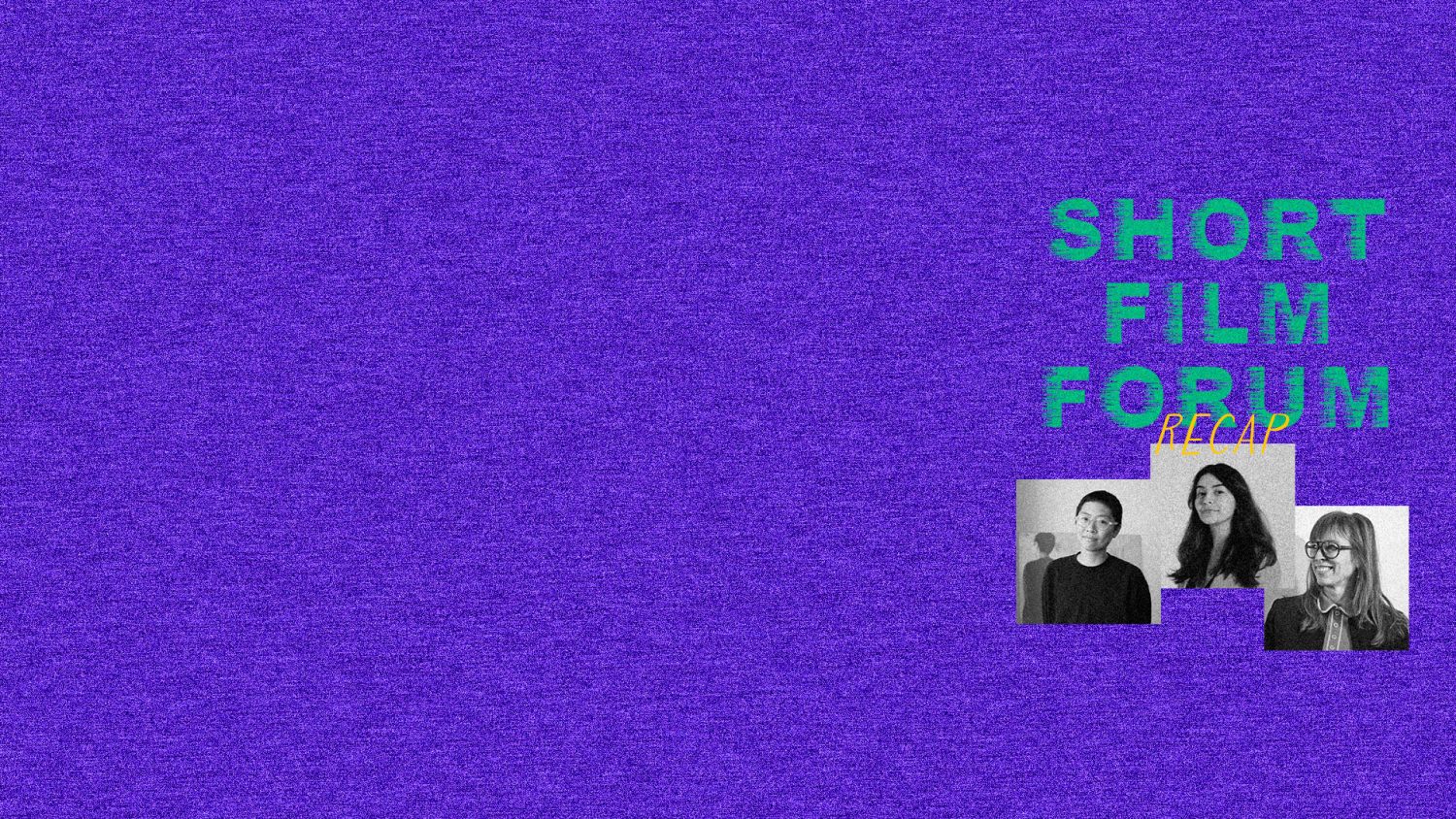By Darunee Terdtoontaveedej, Francis Román, and Maike Mia Höhne for Objectifs Short Film Forum 2023
Familiar names in the international film industry candidly shared their perspectives in the Short Film Forum, a weekend of online talks organised as part of Objectifs Short Film Incubator 2023. Darunee Terdtoontaveedej from CinemAsia Film Festival, Francis Román from South by Southwest (SXSW), and Maike Mia Höhne from Kurzfilm Festival Hamburg discussed their selection process, film fees, and the role of networking. Read on for a recap.
Puiyee: What is the film selection process like for you in the festivals and programmes you’ve worked on?
Francis: Every festival is different and has its own process. For SXSW, submissions come through our website. A combination of screeners, associate programmers, and programmers will then view every single project. As we go through them, we realise some films are not going to make it to the final programme. Consequently, we have programming meetings, where our associate programmers come together and battle it out in the best way possible.
There are many incredible films that don’t make it to the final programme. It’s because of numbers. We get about 4000 short film submissions a year, and last year, I was only able to fit 83 in. There are very limited slots.
Darunee: When I programme short films, they are usually related to a certain theme. I select films according to relevance more than anything else, and I try to be as diverse as possible.
CinemAsia Film Festival mostly programmes feature films. I watch films from other festivals and do my own research through social media, recommendations, and word-of-mouth. I have friends in the industry and we share films with each other. As a foreigner in Europe, I’m mainly interested in alternative narratives and themes such as alienation.
Maike: At Kurzfilm Festival Hamburg, we don’t care about a film’s premiere status. There are films that we cannot not show. At the same time, there are many other films that are interesting too. The question is: What do we do with films that are by, for example, new voices? We try to integrate them to have a balance, and open up the festival for films that haven’t been screened much.
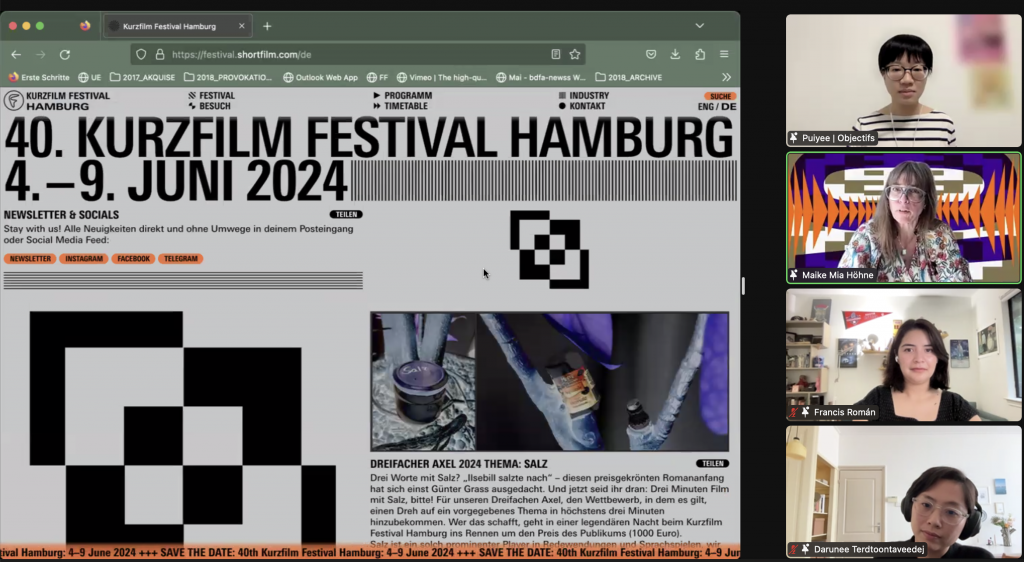
Puiyee: Most festivals have a competition section and an official selection. From our conversations with young filmmakers, a lot of them want their films to be in competition. If their films are selected but are not in competition, they get discouraged. What are your thoughts on this?
Maike: In the end, what is a festival about? Is it about winning? It’s about sharing, isn’t it? It’s about meeting people, networking, fellowship, connecting with people and meeting them at another festival again.
If winning is your only goal, you will have to work super hard, and I don’t know if that would really work out. What may work out in a festival is meeting people, and that is something else.
Darunee: Every festival has different rules regarding who is eligible to compete. For example, some festivals have competitions for first shorts or first feature films. On one hand, it’s nice to recognise somebody’s work for being exceptional. On the other hand, as Maike mentioned, being selected for a festival is already recognition on its own. I don’t know what a competition is for sometimes. Apart from an ego boost, what else do filmmakers get out of it?
Francis: I agree. Being selected is huge. I also agree with Maike that as a filmmaker and creative, you are your biggest advocate. That’s why I recommend filmmakers to have a budget for festival application and travel, so that they can travel if their films are selected. The most important thing to do at a festival is to meet future collaborators.
Maike: Darunee, you put it so nicely – the ego boost. I think filmmakers need ego. It takes ego to believe in a film or vision. Filmmakers need to have this kind of energy to compete, and to go on despite rejections. It is a game. If you win a competition at, say, International Short Film Festival Oberhausen, it does something for your career. Whether you want to make a feature or enter into fine arts next, winning can help you make that step.
Puiyee: What kind of films excite you most?
Francis: Programming is completely subjective. I know a film is working for me when it makes me feel something. I can be watching 20 to 30 shorts a day, and observe that amongst these, there are a lot of technically well-made films. However, they might have no emotional impact on me. They don’t make me laugh or feel scared. When a work impacts me emotionally, that’s when I know it has something.
Darunee: I agree – it’s about emotional impact. There is also the question of sincerity in one’s voice. A film can be very well-made, but if it doesn’t say anything, then there is no reason to support it any further.
Maike: Because we all have private lives, we resonate with different films. When programmers discuss a film selection, there are moments of listening and understanding why someone does not want to go with a certain topic. We also have to think about the position of the festival.
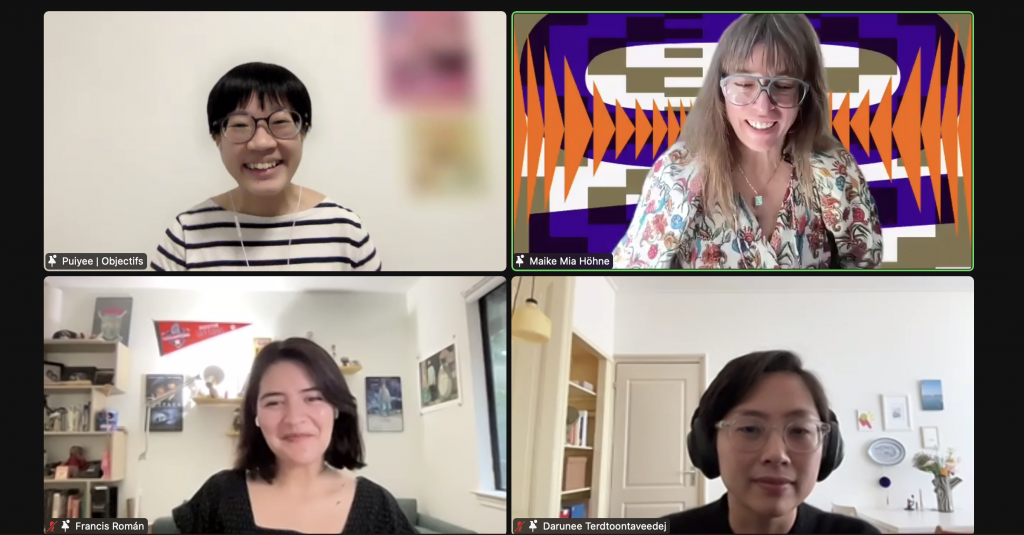
Puiyee: You all have programmed films for years. From your observation, how has the way people use the short film format evolved?
Darunee: I feel like I’m very new in this field. But I think that the short film on its own is an art form. There are people who make short films as a way to get towards making feature films, but I feel it is also okay to continue making short films.
Maike: It’s not so much about the format, whether a film is short or long. It’s really about: What does your idea need? What is it you are saying?
Francis: I agree. One thing I tell filmmakers is to take the time they need to tell the story they want to tell. People sometimes ask: How long should a short film be? There’s no formula!
Do not edit your film to fit a particular festival. You need to make the work you want to make, whatever that is. I can tell when somebody is telling a certain story because it is hot and trendy right now.
Maike: We call those ‘calling card films’. It’s not that a ‘calling card film’ is not well-made though, it’s often very well-made!
As a festival, we have an idea of what we want. Our programme shouldn’t be longer than 75 to 80 minutes, because if we do that, it’s impossible to have three or four programmes a day. I thus tell filmmakers not to go over 25 minutes. But if your film needs 35 minutes, it needs 35 minutes. It will just affect the number of festivals that may accept your film because you are asking for a lot of space.
But why do you want to show at a festival? Is it because some people in the industry say you need to do that? Perhaps you don’t need a festival. Perhaps you just need to keep on doing what you do.
Darunee: I agree because I feel that one needs to ask themselves questions. Like, why do we make films? Why do we make art? Do we do it just to win awards? To get validation? Or are we making films because there’s something important that we want to say and share with the world?
Puiyee: Some filmmakers believe that film fees are a ploy for festivals to make money. They would submit to festivals and track the viewership of their films on Vimeo. And according to them, it doesn’t seem like anyone is watching their films. As festival programmers, what’s the rationale for film fees?
Francis: Unless an entire file plays, it doesn’t count as a play on Vimeo. I don’t think many people watch a film all the way through the credits. I can speak on behalf of SXSW that every film is given full consideration by the festival.
Maike: A lot of festivals, at least in Europe, are financed through public money. We get a certain amount of funding, but it’s not enough.
Darunee: Public money alone is not enough to run a festival. Festivals need money. They need income from somewhere, whether that be sponsorship or submission fees. It’s just a way for a festival to ensure it can run.
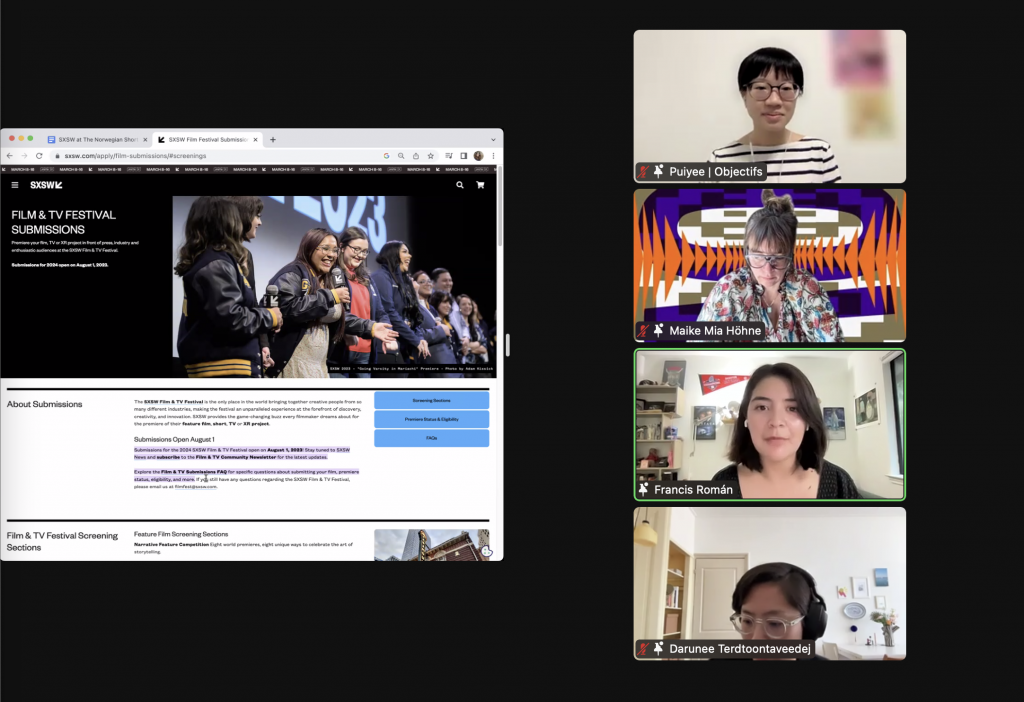
Audience member: What is your advice for upcoming filmmakers to build meaningful relationships with programmers? Any pet peeves?
Darunee: Be nice and patient. Be respectful. If you send a film over and we don’t watch it immediately, it doesn’t mean that we’re not going to ever watch it! It’s just that we might not have time now.
Francis: It’s important to remember that programmers are people too. I have handled the SXSW submissions email account, and I emailed a lot of strangers. People forget that there is a person receiving their emails. Their emails don’t go to a void. We read everything. Everything.
What I do not recommend is emailing us every week or every other week to check on the status of a film. Continuing to email a real person over and over wears their patience out, I would say.
Darunee: Don’t be a stalker!
Maike: If you send in your work, you can trust that it will be seen.
Audience member: How important are personal connections when it comes to having a film be selected for a festival?
Francis: We have to say no to people we know all the time. A work has to speak for itself. We don’t even accept cover letters.
I have definitely received emails from people I met, telling me to programme their films. That’s not how it works! They have to go through the same consideration process. They would likely hear from me personally if their films don’t make it to the programme, but knowing me doesn’t help their chances.
Also, know your film. Sometimes I see the pitfall of filmmakers going, “Oh, I just want to go to these three or four top festivals.” But if your film is a sketch comedy, and the festival that you’re applying to doesn’t play comedies, it’s not a surprise to not be selected. Especially if there are application fees involved, research on what kinds of work festivals have played in the past.
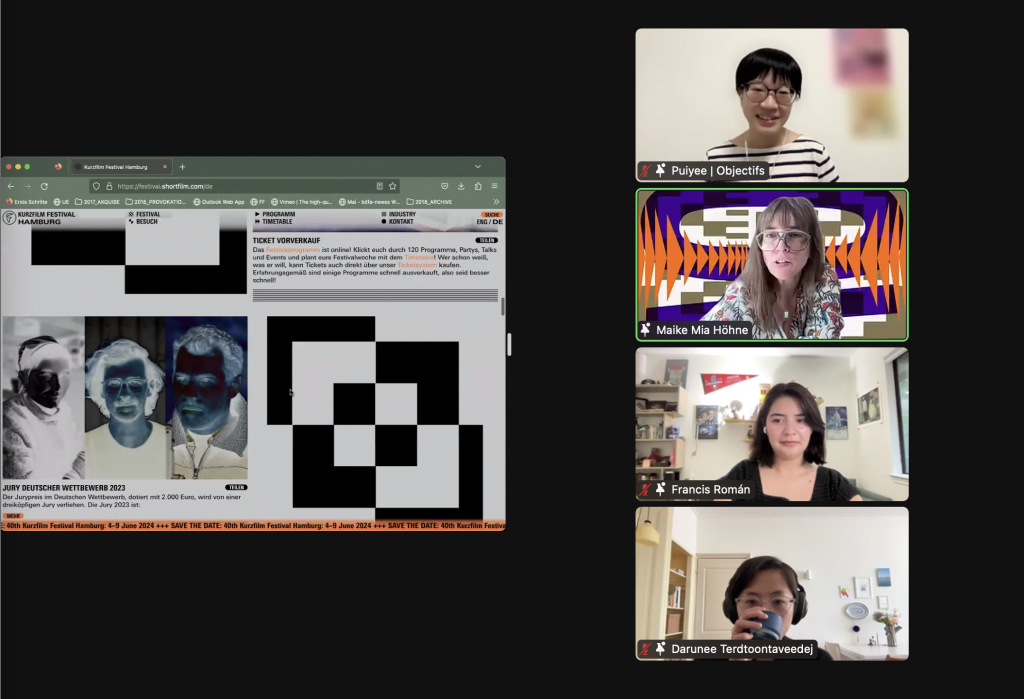
Puiyee: It’s important to do research. But where would be a good starting point to do so?
Maike: Shortfilmdepot is a good database for festivals. When it comes to festivals, I would recommend filmmakers to start locally and meet people whom they can perhaps work with.
Darunee: It is also about having a role model. If your work is similar to somebody else’s in the industry, you might want to see where they have submitted and screened their films before. I think it’s also nice to start regionally and then branch out internationally.
Francis: Some festivals like SXSW have an archive page. Or a list of their previous programming. And if you have the bandwidth, research on short films and where they had been screened. Short films are usually not behind a paywall once they have done their circuit, and will be available online.
Recap by Ng Hui Hsien, Aug 2023.

